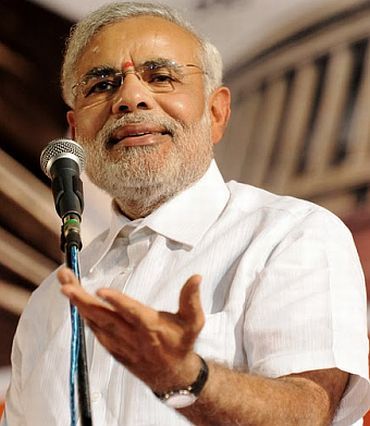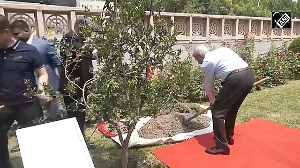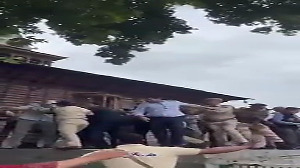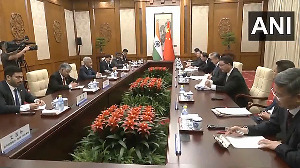 Accusing Congress of "trying to hide in the bunker of secularism", Narendra Modi on Sunday said that it was fighting for its survival with even a 100-seat mark in the new Lok Sabha appearing "an uphill task for it".
Accusing Congress of "trying to hide in the bunker of secularism", Narendra Modi on Sunday said that it was fighting for its survival with even a 100-seat mark in the new Lok Sabha appearing "an uphill task for it".
Reacting sharply to Congress president Sonia Gandhi's accusation that his election campaign was a "dangerous combination of religious fanaticism, power and money", the Bharatiya Janata Party’s prime ministerial candidate said, "faced with certain defeat, fighting for its survival it is once again trying to hide in the bunker of secularism”.
"Its last hope is to somehow cross the 100-seat mark which now appears an uphill task for it," Modi told PTI.
Responding to Sonia's dig that he was promising to make India a paradise, he said, "I have never claimed that I will make India a paradise and that I have solutions to all problems. I am sure even people do not expect this from me."
People of India were not looking forward to miracles but "they certainly deserve a stable, decisive and sensitive government," he said.
Asked about recent attacks on him by Priyanka Gandhi who had accused him of humiliating her family and husband Robert Vadra, the BJP leader said that as a daughter and sister she has a right to campaign for her mother and her brother.
"It is natural that a daughter would like to defend her mother. A sister would like to defend her brother. I do not have any problems with that," Modi said.
Answering a question on how allegations against Vadra would be dealt with in the event of his coming to power, the BJP leader said that he did not believe in politics of vendetta and witch-hunting of which he had been a "victim" for the last ten years.
At the same time, nobody was above law and if somebody had done something wrong, the law must take its own course. "But that has to happen in an institutional manner as per the due process without interference from any quarter. Such actions should never be guided by political considerations."
Modi was asked if he would reach out to three powerful regional leaders Mamata Banerjee, Jayalalithaa and Mayawati who had been critical of him during the campaign but whose support he may need after the poll results were out.
He replied," As of now I firmly believe that the BJP with its pre-poll NDA partners is going to get the required numbers to form a government at the Centre. You must keep in mind that we already have a big and powerful alliance of more than 25 partners.
"We are sure that we will get the numbers to run the government. However, we will need everyone's support and cooperation to run the country."
Modi sharply attacked recent moves by the Congress for an OBC quota for backward Muslims and said that this was nothing but a "last ditch effort" to indulge in "vote bank politics and politics of appeasement on the eve of elections".
The Congress was making such a promise knowing fully well that they cannot implement it, he said, adding, "I must also say that it exposes the true 'secular' character of the party which aims to garner votes on the basis of religion."
Asked if he subscribed to the view that the current election campaign was the most polarised one in India's democratic history, Modi said that he agreed "in a way" that it is a polarised election but "the polarisation is of a different kind this time".
He said, "polarisation is inherent in a democracy. It is natural for people holding different viewpoints to think and vote differently. Per se it is not an undesirable thing. It is the kind of polarisation happening that matters".
The Gujarat chief minister was of the view that the polarisation in this election was between those who believed in the inclusive politics of development and good governance and against who believe in divisive politics of vote banks, caste and religion.
Asked if there was a Modi wave or an anti-Congress wave, or both, Modi replied, "I think it is both. There is a very strong anti-Congress wave together with an equally strong wave for the BJP and its NDA partners".
Describing the elections as "extraordinary and unprecedented", he elaborated that probably it was a first time that a strong anti-incumbency feeling was accompanied by an equally strong desire for change.
Modi declined to answer a question on the post-Godhra Gujarat riots of 2002 but said in an answer to another question that his opponents had not been able to find any serious allegations of corruption, nepotism or incompetence against him.
Asked if he would like to assure Muslims that they should feel safe and secure and that they will not be discriminated against by a government led by him, the BJP leader said that there was no reason for anybody to feel unsafe and insecure, be it Hindus or Muslims.
"If anybody should feel insecure, it is the parties who treat Muslims as vote banks and do nothing for their development. Their politics has reached its expiry date. Such parties better improve or they face extinction." he said.
Modi emphasised that there was no reason for anyone to feel unsafe and insecure under a BJP government.
"We are committed to the safety, security and development of 125 crore Indians which includes all Hindus, Muslims, Sikhs, Christians etc. Our motto is 'sabka saath sabka vikas' (everybody's support, everybody's development)," he added.
Asked about his recent reference to 'Ganga-Jamuni tehzeeb'(composite culture) at the time of filing his nominations from Varanasi, Modi said that this was his message of India First--Let us unite together rising above caste and religion and let us all work together for development and prosperity.
Modi made the following other points:
Corruption: I have a clear time-bound action plan in mind and we will ensure that when the country goes to polls for the 17th Lok Sabha (scheduled for 2019), there will be no place for corrupt and criminal elements.
The action plan would first target sitting MPs who have cases agaisnt them regardless of party and political affiliations. Supreme Court would be requested to establish fast track courts across the country to expeditiously try offences against them so that all cases are decided within one year.
This would ensure that who are found not guilty were absolved of all allegations and malicious propaganda. Those who are found guilty would be punished and vacancies arising out of their disqualification will be filled by honest and clean people.
In the next stage, all those who had contested elections and members of Panchayati Raj institutions as well as urban local bodies would be targeted. The message that we want to send is that if you become a MP or MLA, the cases against you will be fast tracked.
The leader he admires the most in post-Independence India: Sardar Patel was certainly a stalwart who did a great job as the country's first home minister in uniting the entire country and merging the 500-odd princely states in India. He is one leader whom I admire for his ability to place national interests above all.
His plans between May 12 when the 9-phase polling comes to end and May 16 when counting of votes begin: I don't think I will able to get any day off. I will decide what to do during 2-3 days only on the 12th.
However, I would like to devote some time to thank the lakhs of volunteers and karyakartas who have worked very hard during the last few months.











